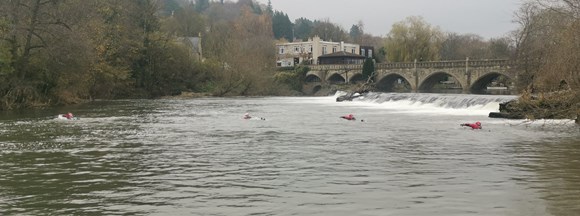
15 May 2020
AF&RS warns of the dangers of swimming in lakes and rivers

Avon Fire & Rescue Service (AF&RS) is warning of the dangers of swimming in lakes and rivers as sports and activities start to return to normal.
As the Government starts to lift restrictions on the amount and types of exercise people can take part in, members of the pubic are expanding their range of activities under strict social distancing guidelines out in the open.
Swimming pools, however, remain closed which may lead to some finding open water as a suitable alternative.
Combined with the current spell of warm weather, this could have fatal consequences as there are those who will put themselves in danger by cooling off in rivers, lakes, reservoirs or marinas.
Across our region, those who need to cool off or simply exercise are entering dangerous waterways with no knowledge of what lurks below the surface.
Furthermore, the ice-cold nature of the water in relation to the air temperatures can lead to cold water shock - a potential killer.
Although coastal resorts are urging visitors to stay away, those that choose to visit the beach should be mindful of not stretching the resources of our Coastguard colleagues or risk injury which will further burden our health service.
Simon Shilton, Assistant Chief Fire Officer for AF&RS, said: “With the weather getting warmer we are keen to highlight water safety awareness to children, their parents and as wide a cross-section of the local community as possible.
“With various waterways, lakes, a dangerous tidal river, docks and marinas, the Avon Service area has many high-risk areas.
"We would like to highlight the dangers of open water and encourage people, whatever their age, to take extra care.
“People do not understand that even the strongest swimmers can find themselves in difficulty as the cold water causes muscles to cramp.
“There is then a strong possibility that they cannot swim due to muscular cramps which can then lead to drowning.”
Follow these 10 simple steps to stay safe around water:
- If someone falls into deep water, call 999. If you are near the coast ask for the coastguard, if you are inland ask for the fire service and ambulance.
- Never enter the water to try and save someone. This usually ends up adding to the problem. If you go into the water you are likely to suffer from cold water shock, which will leave you unable to help.
- In an emergency, look around for any lifesaving equipment. Depending on where you are, there might be lifebelts or throw bags – use them. If there is no lifesaving equipment, look at what else you can use. There may be something that can help them stay afloat – even an item such as a ball can help.
- You could attempt to reach out to someone struggling in water. Clothes such as scarves, or long sticks could be used. If you do this, lie on the ground so your entire body is safely on the edge and reach out with your arm. Don’t stand up or lean over the water.
- If you manage to get the person out of the water, they will always need medical attention. Even if they seem fine, drowning can occur at a later stage if water has already entered the lungs.
- If you do fall into the water, remember the RNLI’s safety message – Float to Live. Fight your instinct, lean back, gently move your arms and legs and float until you can control your breathing.
- When fishing, check that the spot you have chosen is safe. Remember that riverbanks can erode.
- Avoid throwing sticks or balls near water for dogs and never enter the water to try and save a dog – the dog usually manages to scramble out.
- Remember that alcohol reduces inhibitions and can mean you take more risks. If you fall into water after drinking, your chances of being able to get out of the water are decreased due to alcohol’s impairment of simple movements.
- If fishing, make sure you let someone know where you are going. Make sure you have a fully charged mobile and a good signal.
Contact Information
Avon Fire & Rescue Service
Media and External Communications Officer
Liam Corcoran
0117 926 2061 Extension: 282
07977467634
liam.corcoran@avonfire.gov.uk
Notes to editors
Avon Fire & Rescue Service
AF&RS provides emergency and protection services to the communities of Bath & North East Somerset, Bristol, North Somerset and South Gloucestershire.
We are committed to providing a safer place for people to live, work and visit across an area of 134,753 hectares and a population of over one million.
While firefighting has traditionally been at the forefront of our work, the role of a modern fire and rescue service has increased to cover the core functions of 'preventing', 'protecting' and 'responding'.
A lot of our work now focuses on how we can prevent accidents and emergencies happening in the first place, as we believe this is the best way to protect our communities. We do this by providing advice and education through events, visits, campaigns and partnership working.
Avon Fire & Rescue Service
AF&RS provides emergency and protection services to the communities of Bath & North East Somerset, Bristol, North Somerset and South Gloucestershire.
We are committed to providing a safer place for people to live, work and visit across an area of 134,753 hectares and a population of over one million.
While firefighting has traditionally been at the forefront of our work, the role of a modern fire and rescue service has increased to cover the core functions of 'preventing', 'protecting' and 'responding'.
A lot of our work now focuses on how we can prevent accidents and emergencies happening in the first place, as we believe this is the best way to protect our communities. We do this by providing advice and education through events, visits, campaigns and partnership working.

